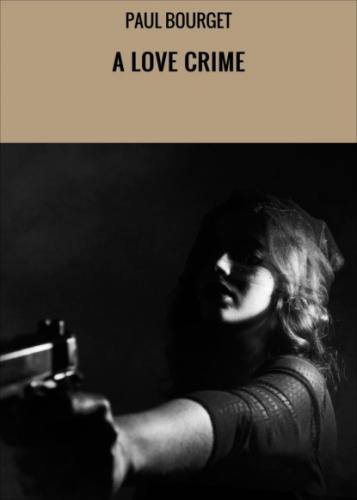PAUL BOURGET
A LOVE CRIME
Dieses ebook wurde erstellt bei
Inhaltsverzeichnis
DEDICATION.
A LOVE CRIME
PAUL BOURGET
_Author of a "CRUEL ENIGMA._"
LONDON
_W. W. GIBBINGS, 18 BURY STREET W.C._
1892.
TO GASTON CRÉHANGE.
Many days have elapsed, my dear friend, since our childhood, but they
have passed away without effecting any alteration in the affectionate
feelings we then entertained. In memory of an intimacy of heart and mind
which has never known a cloud, it is very pleasant to me to write your
name at the beginning of that one of my books which you preferred to all
the rest. It is further the book in which I have stated with most
sincerity what I think concerning some of the essential problems of the
modern life of our day. May this complete sincerity, by which you, the
truest and most loyal being I know, have doubtless been attracted, plead
in favour of the work with readers who would otherwise be startled by a
certain boldness of depicture and cruelty of analysis!
For the rest, whatever may be the verdict of public opinion respecting
"A Love Crime," as I have called this minute diagnostic of a certain
distemper of the soul, it will always be possessed of one great merit in
my eyes, for it will have pleased you, and have enabled me once more to
subscribe myself, my dear Gaston, your ever faithful friend,
CHAPTER I
The little drawing-room was illuminated by the soft light of three
lamps--tall lamps standing on Japanese vases and bearing globes upon
which rested flexible shades of a pale blue tint. The door was hidden by
a piece of tapestry; two walls were hung with another piece, which was
covered with large figures. Both windows were draped with
curtains--drawn just now--of deep red colour and heavy of fold.
The apartment thus closed in had a homelike air, which was heightened by
the profusion of small articles scattered over the furniture:
photographs set in frames, lacquered boxes, old-fashioned cases, a few
Saxon statuettes, books stitched in covers of antique stuff, such as
were coming into fashion in the year 1883. The wreathing foliage of an
evergreen plant showed in one corner. Close beside it, an open piano
displayed its white keys. An English screen with coloured glass and a
shelf on which tea-cups, books, or work might be laid, stood in folds on
one side of the fire-place. The fire burned with a peaceful crackling
noise which formed an accompaniment to the sound proceeding from the
tea-pot as the latter received the caresses from the flame of its lamp
on the low table designed for such service.
The furniture of the somewhat crowded drawing-room presented that
composite appearance which is characteristic of our time, together with
the peculiarity that everything in it seemed to be almost too new. At a
first glance, certain slight indications would have seemed to show that
its Parisian aspect had been voluntarily aimed at. Objects were
contrasted here and there; there were, for instance, little
old-fashioned silver spoons; on the walls were two excellent copies of
small religious pictures, to which memories of childhood were certainly
linked, and which could have come only from an old country house. The
photographs, also, witnessed, by the dress and demeanour of the
relatives or friends represented, to altogether provincial
relationships. The feeling of contrast would have become still more
perceptible to one visiting the other rooms and finding everywhere
evident tokens that the persons dwelling in them had lived but a very
short time at Paris.
This small-sized drawing-room belonged to a small-sized house situated
at No. 3½, Rue de La Rochefoucauld. The lower part of this street,
which descends in a very steep slope to the Rue Saint-Lazare, comprises
several private houses of very varied build, and a few retired dwellings
surrounded by gardens. The house containing the little drawing-room was
built for an actress by a celebrated financier under the Empire, at a
period when the Rue de
